Article 55: Thomas Jefferson: “Coffee – the favorite beverage of the civilized world!”
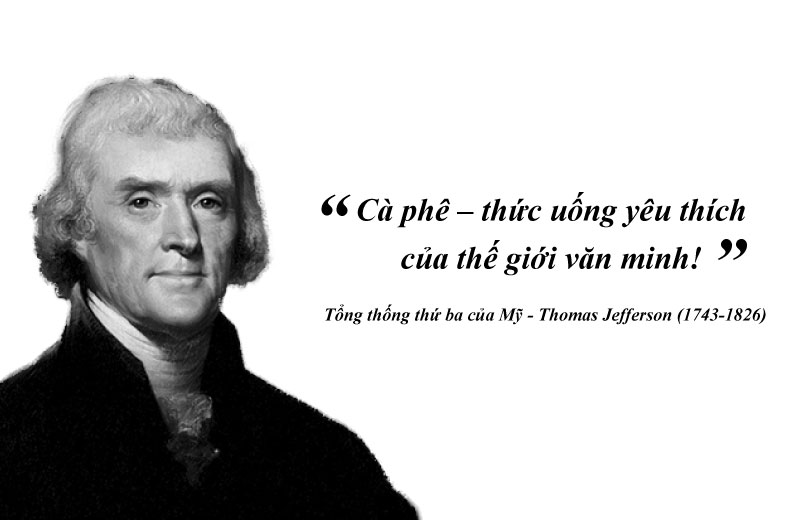
“Coffee – the favorite beverage of the civilized world!” Third President of the United States – Thomas Jefferson (1743-1826)
Americans identify themselves as a Caffeine Nation. Coffee is considered as the necessary energy for the process of changing the concept of life and lifestyle in order to create a new life.
Looking for the shape of the civilized world from the coffee shop
In the 17th century, the great powers of Great Britain, France, and Spain, in turn, established colonial states in the Americas to colonize and turn the Americas into colonies. In the early days, the Americas were a society that experimented with Europe’s Enlightenment ideals with the ideology of humanism, freedom, and democracy. Until the British expanded their influence in the Americas, they expressed their ambition to fully exploit the colonial economy by controlling trade, slavery, exploitation…
America was originally a land that was not imposed by any social institutions before, and then was influenced by liberal and freedom ideas. Consequently, British rule created conflicts over human rights and national rights. The British believed that America was a colony and was used to serve British interests. Americans insisted they deserved to live with full freedom and equality, they were not made to be submissive. Thinkers, philosophers, politicians, etc. began to promote the process of establishing political institutions and a civilized, ethical society for the Americans and America.
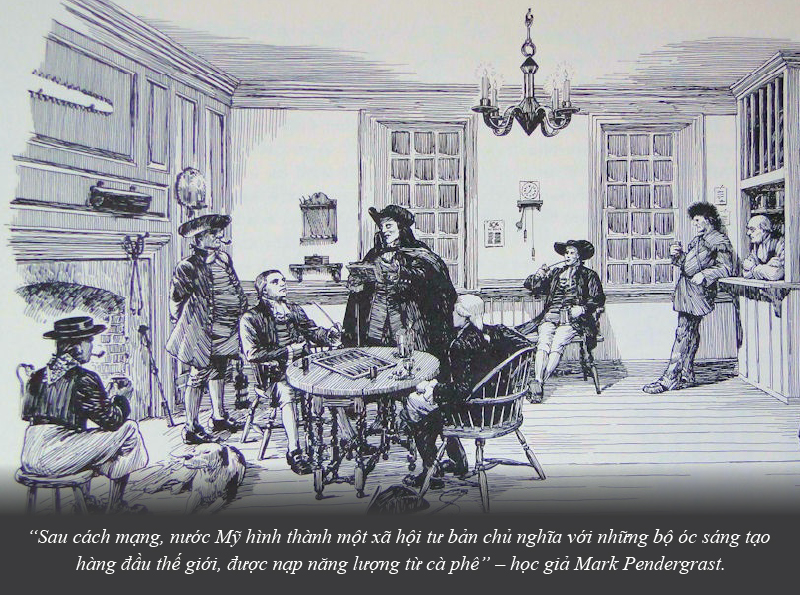
“After the revolution, America formed a capitalist society with the world’s leading creative minds, fueled by coffee” – Scholar Mark Pendergrast.
Nation-founders Benjamin Franklin, Thomas Jefferson, James Madison, George Washington… promoted the progressive ideology of the Enlightenment movement, especially the concept of “Pursuing happiness by practicing reason and truth”. Benjamin Franklin, George Washington and Thomas Jefferson, who were members of the Freemasons – the Society of Actions for the Advancement of Humanity, which originated in English cafes in the early 18th century – successfully applied Freemasons to the hold lectures in cafes. From here, highly influential enlightening works such as Jean-Jacques Rousseau’s “Social Contract”, John Locke’s “An Essay Concerning Human Understanding”, “Some Thoughts Concerning Education”… spread widely throughout the 13 colonies. .
Coffee shops bearing American history such as Green Dragon, Union Oyster House, The Crown Coffee House, North-End (Boston), Merchants Coffee House, King’s Arms (New York), London Coffee House, Ye Coffee House (Philadelphia)… were the center of the American Enlightenment movement. Philosophers, revolutionary thinkers, freedom-loving people met to discuss justice and individual equality, encouraging the building of civilized government with a constitution guaranteeing freedom for all citizens.
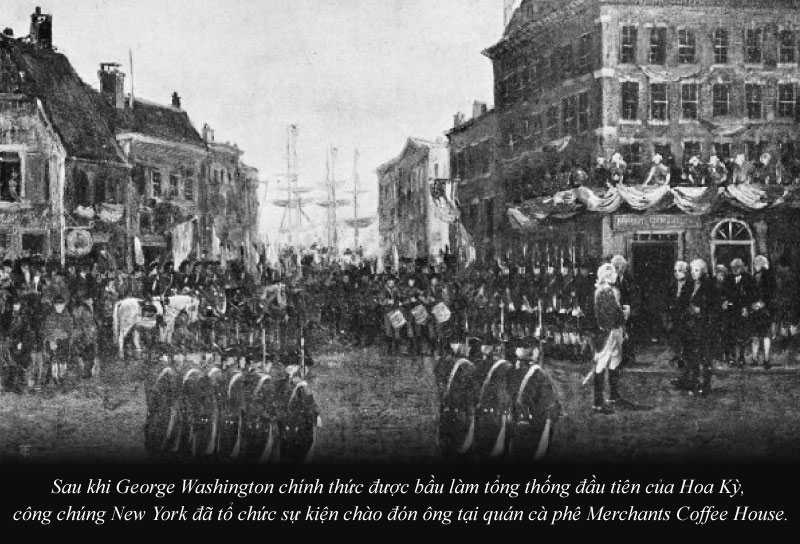
After George Washington was officially elected the first president of the United States, the New York people held an event to welcome him at the Merchants Coffee House.
The fundamental doctrines of building a civilized society discussed in coffee shops deeply influenced the thought of the nation founders. Benjamin Franklin wrote “Dissertation on Liberty and Necessity”, John Adams wrote “Thoughts on Government”, Thomas Paine wrote “Common Sense”, “Rights of Man”, Jonathan Edwards wrote “Freedom of the Will”… defining more clearly about the civilized world that America aspired to realize. This ultimately fueled the political revolution in early America.
The oldest and most famous City Tavern cafe in Philadelphia is associated with important events in the history of the formation of the United States. In 1774, the first Continental Congress held a meeting at the City Tavern to oppose British oppression. In June 1776, Thomas Jefferson, along with John Adams, Benjamin Franklin, Roger Sherman, and Robert Livingson discussed continuously for several days to draft the Declaration of Independence with the message embodying the ideals of the United States “that all men are created equal, that they are endowed by their Creator with certain unalienable Rights, that among these are Life, Liberty and the pursuit of Happiness”. This is the event that Americans call fate. Not only was a new nation born, but a new society according to republican principles was being formed.
Creating life over a cup of coffee
Giving birth to a new government, Americans continued to build a legal framework for the ideals set forth in the Declaration of Independence. In the late 18th to mid-19th centuries, the United States experienced an “age of reform”. Tens of thousands of Americans joined creative movements to advance America’s political, economic, and social standing. They fervently expressed pride and patriotism by using and displaying national symbols such as the image of the founders, bald eagles and popularizing the culture of coffee as the representative drink of patriotic spirit. Average coffee consumption increased from 3 pounds per year to 5.5 pounds in 1850 and 8 pounds in 1859.
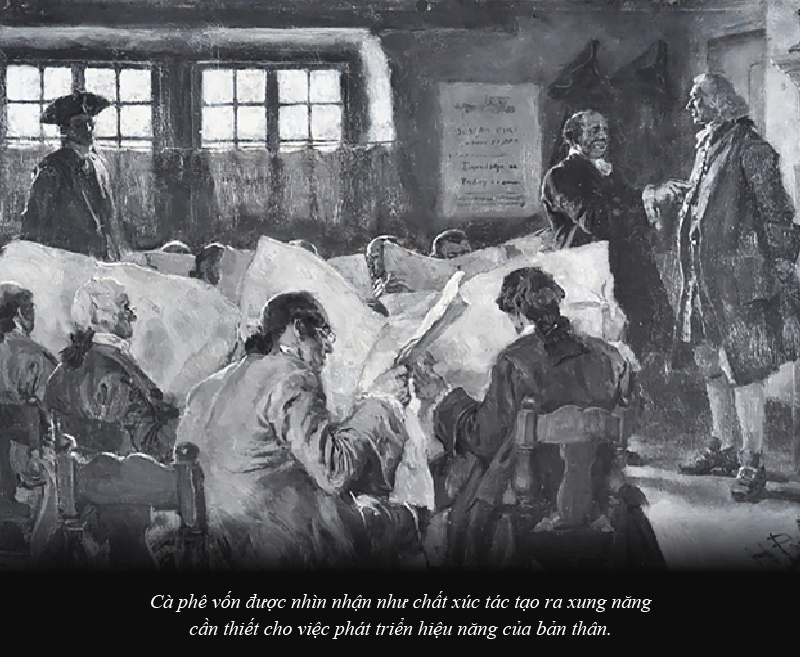
Coffee has been recognized as a catalyst that creates the necessary impulses for the development of personal efficiency.
In particular, to really get rid of dependence on Britain, the new government promoted economic development. During this period, coffee was honored by Americans as the “king of the dining table”. Coffee shops continued to serve as economic hubs and working spaces for Americans.
On Wall Street (New York), a group of famous merchants held financial transactions on the second floor of the Tontine Coffee House. This activity was the precursor to the birth of the New York Stock Exchange. Exchange Coffee House (Boston) was built with skyscraper marble, embodied the extraordinary imagination of Americans. For 9 years of operation, Exchange Coffee House served as the financial center of Boston as well as a venue for high-level political meetings.
The Concert Hall Cafe (Boston) was the venue for many of the official meetings of the Freemasons and the Cincinnati Association (including contemporary military and political leaders). Niblo’s Garden was transformed from a cafe into a New York entertainment complex, where the first Broadway musical in America was performed. By the mid-19th century, Niblo’s Garden was New York’s most modern theater. From discussions in cafes, the Metaphysical Club gave birth to Pragmatism, the St. Louis developed German Idealism and Transcendentalism with a focus on turning thought into action.
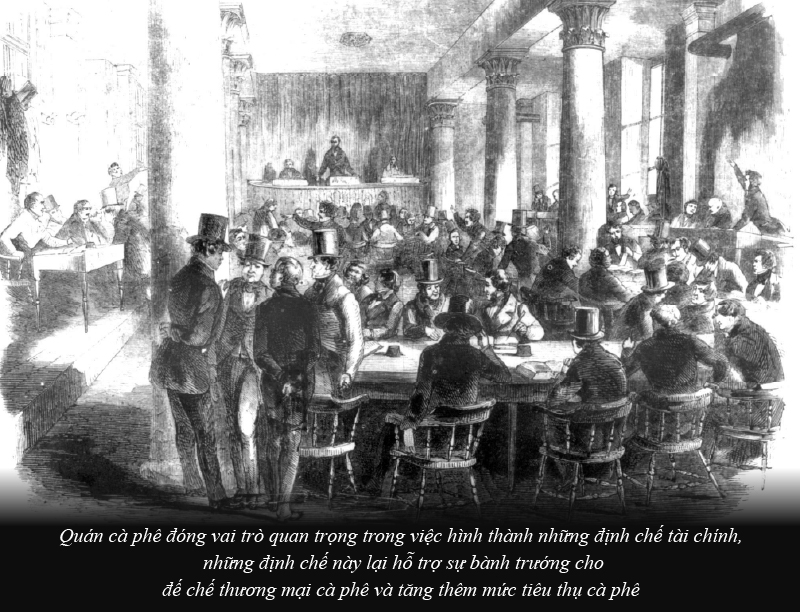
Coffee shops played an important role in the formation of financial institutions, which in turn supported the expansion of the coffee trading empire and increased coffee consumption.
In the 19th century, a great intellectual shift made the United States a leader in the fields of moral philosophy, educational reform, science, and most notably, political philosophy. The amount of coffee imported into the US accounted for about a third of the world’s coffee in 1876. Europe recognized the US as the Fabled Republic.
The influence of coffee and coffee shops has exceeded a form of drink and conversation space, in 1824, Thomas Jefferson affirmed “Coffee – the favorite beverage of the civilized world!” Before that, in 1721, political philosopher Montesquieu also said that “Coffee has the power of awakening the brain and coffee houses are spaces for discussion that awaken the rights that many people desire”. Obviously, the appearance of coffee and coffee shops brought a constructive way of thinking and acting, which was the beginning of the process of shaping civilized society.
View more: https://bit.ly/caphetrietdao
THE REAL COFFEE
ROASTED ONLY FOR PEOPLE OF WISDOM!
Source: “The Philosophical Way of Coffee” – copyright by Trung Nguyen Legend


